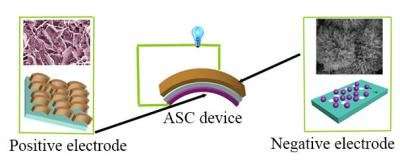FeCo-selenide—a possible next-generation material for energy storage devices

In a paper to be published in the forthcoming issue of Nano, a team of researchers from the China University of Mining and Technology have fabricated an asymmetric supercapacitor (ASC) based on FeCo-selenide nanosheet arrays as positive electrode and Fe2O3 nanorod arrays as negative electrode. There is evidence that FeCo-selenide could be a promising next-generation electrode material for energy storage devices.
Supercapacitors have been considered as the most attractive candidate for energy storage devices, and are widely used in the field of portable electronic equipment and electric cars due to their high power density, fast charge/discharge rate, low maintenance cost and long cycling life. Similar to the transition metal bimetallic oxide and sulfides, metal selenides can be considered as a promising candidate for electrode materials, as selenium belongs to the same group element as sulfur.
The FeCo-selenide was synthesized using a two-step hydrothermal process, with Ni foam as substrate and current collector. The as-prepared FeCo-selenide nanosheet arrays on Ni foam shows specific capacitance of 978 F/g (specific capacity of 163 mAh/g) obtained at current density of 1 A/g and cycle stability of 81.2 percent was achieved after 5000 cycles. And the ASC device operating at 1.6 V delivers a maximum energy density of 34.6 W h/kg at power density of 759.6 W/kg, which is higher than that of many other ASC reported previously. The practical application of the ASC device was explored by assembling several capacitors into a series circuit to light 1 LED bulb and light board of "CUMT". The ASC device exhibited excellent electrochemical performance which provides the evidence that FeCo-selenide could be the next-generation promising electrode material in energy storage devices.
The team at China University of Mining and Technology is currently exploring options to better control the high voltage output and create high-performance ASC. For optimal electrochemical performance and decrease in cost, the team would also like to explore a device based on selenide composites in its application.
More information: An Ye et al, In Situ Growth of FeCo-Selenide on Ni Foam as High-Performance Electrode for Electrochemical Energy Storage Devices, Nano (2018). DOI: 10.1142/S1793292018500789
Provided by World Scientific Publishing




















